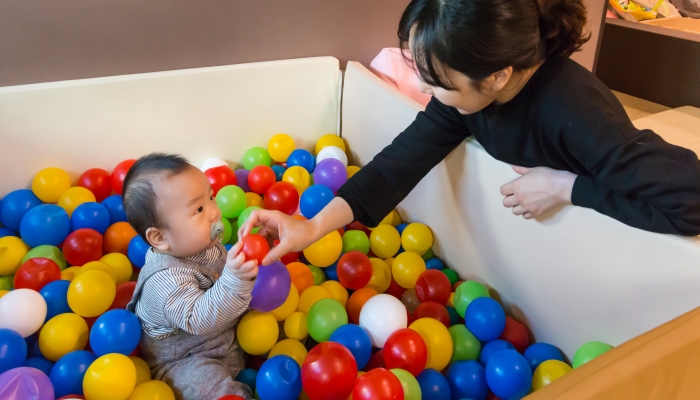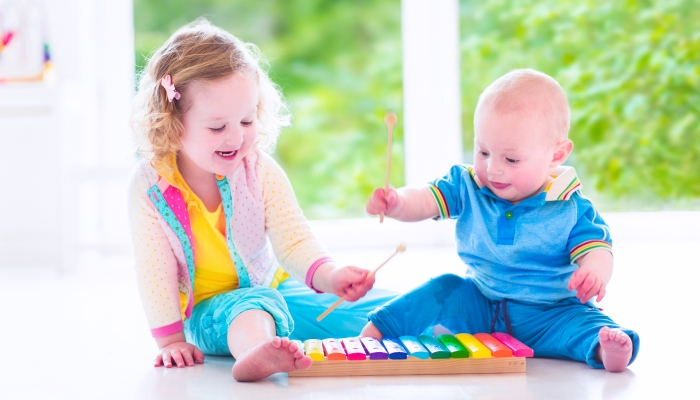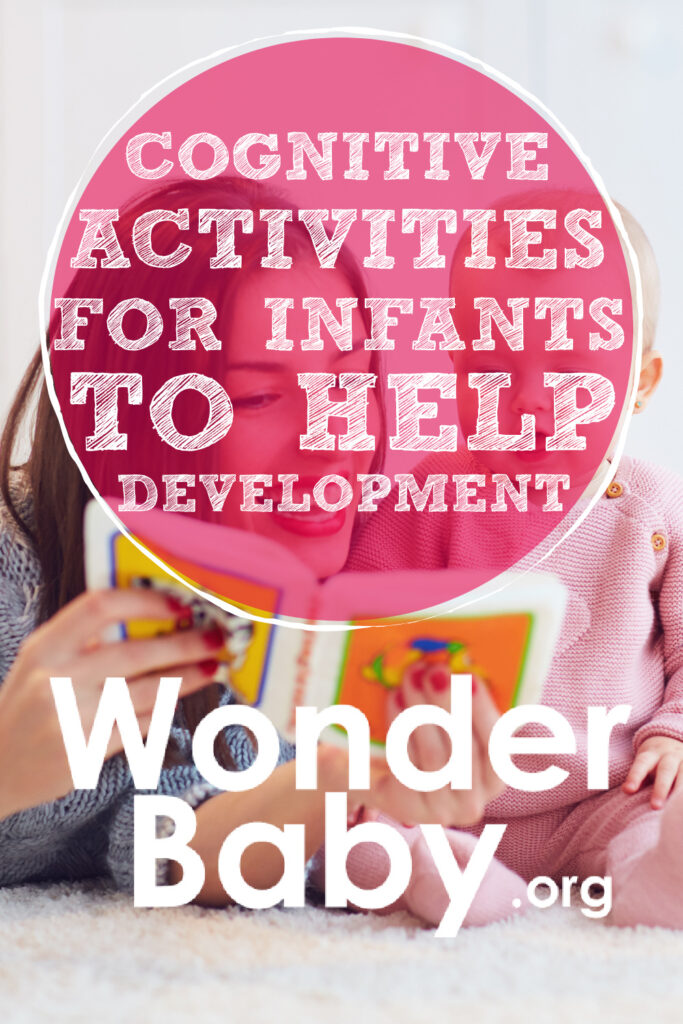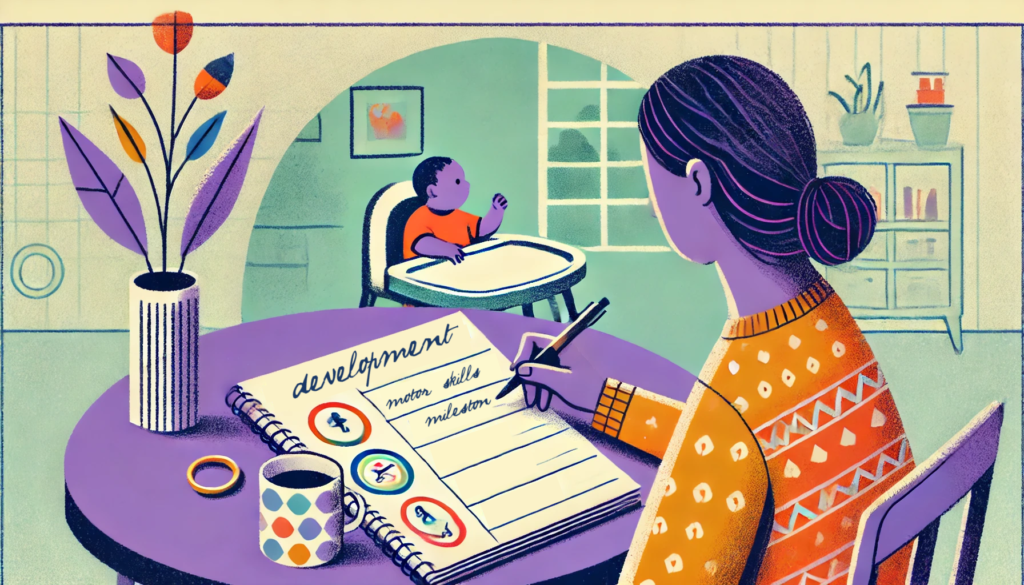18 Cognitive Activities for Infants to Help Development

- Cognitive activities for infants grow your baby’s brain.
- Early childhood is a period of intense cognitive development, and your baby is a learning machine.
- Your love and attention help build a healthy brain and can even protect against the negative effects of stress.
While learning never stops, the first few years of your baby’s life are the busiest when it comes to building their brain. More neural connections are forged in the first three years than at any other point in your baby’s life.
You can best support your child’s cognitive development with a nurturing and loving relationship, a safe space to explore, and plenty of time to ponder and process this fascinating new world.
It sounds simple, but looking after a baby is A LOT.
Maybe you don’t have the energy to think about adding activities into the mix, or you’re worried you’re not doing enough or tiring yourself out trying to do too much.
Rest assured, supporting your baby’s cognitive skills isn’t about adding more to your to-do list.
The activities that follow will boost your baby’s cognitive skills while also helping you and your baby bond and relax. So, let’s dive a little deeper and discover more about cognitive development.
Cognitive Development of Infants: All You Need to Know
While physical development describes how the body grows, cognitive development is all about the brain and how your baby learns thinking skills. This might sound super complicated and scary, but cognitive development is happening all the time.
Babies are born ready to learn.
Your baby’s senses (hearing, smell, taste, touch, and sight) began developing in the womb. By the time they’re born, they:
- Recognize your voice and smell.
- Have a full set of taste buds.
- Turn their head when stroked on the cheek.
- Grasp your finger when placed in their palm.
This early start on gathering sensory information helps your baby adapt to wherever they’re born. A study in Germany found newborns cry in their native language, matching patterns in their mother’s speech.
Every moment is a learning opportunity, but your baby’s favorite source of information is you. Not only are you their first model for language and movement but you’re also their emotional barometer. Looking to see how you respond helps your baby make sense of the world.
At first, your baby soaks up sensations without a filter, not yet sure what will be important. Over time, repeated events begin to leave a lasting impression and your baby’s brain organizes and prioritizes the information it receives.
Research from Norway warns that trying to rush children’s development can be counterproductive, but your baby’s brain needs stimulation to grow.

What Can You Do to Boost Your Infant’s Cognitive Development?
Along with planned cognitive development activities, your everyday interactions with your child are an opportunity to teach them and boost cognitive development.
Love your baby.
A 2014 study in China found that children with secure maternal attachments performed better in cognitive assessments.
Use routine activities like feeding and changing as natural reminders to slow down and focus on your baby. Take the time to get out toys, play, and make silly faces with your little one to help them feel loved.
Breastfeed for as long as possible.
Breast milk is the perfect source of nutrition for your baby, protecting them from illness and infection while also making them smarter.
In 2021, Liangying Hou et al published a review of 15 studies that found breastfeeding leads to higher intelligence scores.
Take care of yourself.
You need to look after yourself so you can meet your baby’s needs.
Stress shuts down learning and babies are super sensitive to your emotions, so get support where you can and prioritize your mental and physical health.
Let your baby play.
Even the earliest stages of play are vital for learning.
Leave time in your schedule for your baby to observe, explore, and experiment. This might not look like much at first, but free play is essential for growing those important connections in your baby’s brain and building creativity and concentration.
Follow your baby’s lead.
Respect your baby. Let them know what you’re doing and see how they respond, you’ll soon learn to pick up on their cues.
By honoring their preferences where you can, you’ll gain confidence and closeness that will set the tone for a strong and supportive relationship in the years ahead.

6 Cognitive Activities for Infants 0–3 Months
1. Babywearing
Carrying your baby in a sling or baby carrier provides a different view of the world and supports observation, balance, and language skills. Your baby gets the comfort of being close while you’re hands-free.
2. Infant massage
Touch is one of the most developed senses at birth. Massage is a soothing sensory activity for infants, relieves stress, and releases hormones that promote growth and bonding.
3. Narrate your day
Your baby loves the sound of your voice and listening helps them learn language, relationship and attention skills. Leave plenty of space for them to join the conversation.
4. Reading
Books give your baby access to a wide vocabulary and more of the world. It’s never too early to read to your baby and familiar stories enhance any evening routine.
Using different voices for different characters and opting for books with bright colors and different textures can help to keep your child engaged as you read together.
5. Decorate with art
Your baby’s vision is the last sense to develop. Hang up mobiles and pictures with contrasting colors, particularly black-and-white images, describe what you see, and notice what captures their attention.
6. Show your delight
Your baby learns much about the world from you, but more importantly they learn about themselves. When you’re pleased to see them and delight in their very existence it builds confidence and curiosity, strong foundations for cognitive development.
6 Cognitive Activities for Infants 3–6 Months

7. Keep talking
Conversation is a fantastic learning tool, and lots of eye contact with your baby encourages them to join in, building strong bonds and supporting language development.
8. Floor time
Don’t stress too much about tummy time—most babies prefer lying on their backs. All you need to help your baby roll over is plenty of time on the floor. When they’re ready, they’ll discover tummy time for themselves.
9. Looking in the mirror
Faces are fascinating for babies, and they love mirrors. Whether you lift them up to share the experience or give them their own mini mirror, it helps improve visual tracking and boosts their daily dose of eye contact.
10. Take a bath together
From the wonder of simple science experiments to the benefits of skin-to-skin, bathtime effortlessly adds a wealth of cognitive development activities to your day. If your baby’s not a fan, joining them in the tub can make it more relaxing for you both.
11. Get outside
Whatever the weather, the great outdoors is packed with new and exciting sensations. Give your baby a daily dose of vitamin D, improve their sleep, and inspire a life-long love of nature simply by visiting the park, enjoying a day trip, or relaxing in the garden.
12. Treasure baskets
Encourage your baby’s curiosity with a collection of everyday objects to hold and explore. Your baby loves a multi-sensory experience, so choose natural and non-toxic with no nasty choking hazards.

6 Cognitive Activities for Infants 6-12 Months
13. Play peekaboo
Your baby will love the game of peekaboo. Add a sprinkle of clapping and action rhymes throughout your day and you’ll have the perfect recipe for improving memory, concentration, and social skills.
14. Make some music
Lots of the best baby toys are musical but you can also make your own. Lullabies, nursery rhymes, homemade shakers, and banging wooden spoons on upturned saucepans all bring joy and benefit brain development.
15. What’s in the bag?
Grab a pillowcase and fill it with your baby’s favorite possessions. Take them out one by one for a simple guessing game or let your baby delve deep to see what they can find, such good exercise for those emerging fine motor skills.
16. Sorting and stacking
Stacking blocks and cups are great cognitive activities helping develop your baby’s concentration, coordination, and decision-making skills.
17. Sign language
Learning sign language with your baby can be lots of fun and reduce frustration as your baby finds new ways to make their needs known.
18. Extend the evening wind-down
As your baby gets more mobile and independent you may spend less time together during the day. They still need lots of your attention and may crave more at night. Extending the bedtime routine can give you more time to spend together and minimize stress and upset, so your baby’s brain has more resources for learning.
FAQs
What foods are good for babies’ brain development?
Breast milk is the perfect food for your baby and supports your baby’s physical, social, emotional, and cognitive development. The American Academy of Pediatrics recommends exclusive breastfeeding for the first six months, to be continued alongside the introduction of solid foods up to the age of two and beyond.
What are the signs of an intelligent baby?
It’s difficult to define and measure intelligence, and development is neither a race nor takes a strictly linear path. Your baby will develop at their own pace and gain a unique set of skills, knowledge, and understanding that’ll continue to evolve throughout life.
Unconditional love and strong relationships help most babies thrive, but contact your doctor for advice if your baby:
- Avoids eye contact.
- Lacks curiosity.
- Is not moving toward developmental milestones.
- Shows signs of a cognitive developmental delay.
How do rattles help in the cognitive development of babies?
Rattles are a classic baby toy and can encourage visual and sound tracking, fine motor skills, and hand-eye coordination.
Leaving a rattle close to your baby will allow them to reach out and grab it if they want, but it’s not an essential baby item. Your baby will learn far more from their interactions with you and the natural sensations of the world, so don’t worry if your baby’s not interested in their rattle.

Related Posts

Development, Special Needs
How to Track Milestones for Developmentally Delayed Babies
Parents of developmentally delayed babies can explore practical tools and strategies to track milestones, celebrate progress, and support their child’s unique developmental journey.

Fine and Gross Motor
5 Alternatives to Tummy Time for Babies with Motor Development Challenges
Does your baby struggle with tummy time due to motor development challenges? These alternatives to tummy time will offer the same benefits.

Development
Should Twins Share a Room?
Wondering if your twins should share a room? We’ll explore the pros and cons of room-sharing for twins right here before you make your decision.